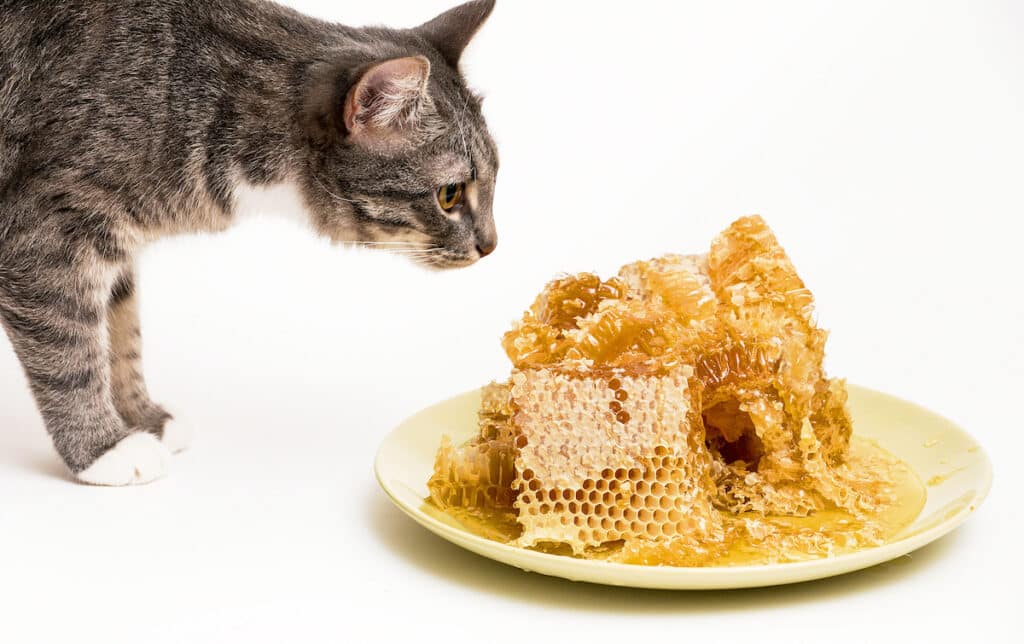Cats can eat honey. However, veterinarians’ concerns go beyond the eating experience to include health and safety. Most veterinarians advise against honey because of digestive issues, stomach pains, potential weight gain, and unknown benefits to cat health.
When establishing what is safe for your cat to eat, your veterinarian will consider its anatomy and medical background. Your veterinarian may mention that cats don’t require sugar and probably don’t care for it anyway. In actuality, the majority of cats are “sweet blind” and cannot detect sweet foods.
Do Cats Like Honey?
Generally speaking, cats dislike honey. Because it is a carnivore, your cat cannot taste sweet things. Your cat won’t have the same sensory experience as you would if you shared a tasty food with them. Carnivorous animals typically seek for foods with high fat content. It’s not because your cat is a sugar addict if you’ve ever seen them lick an ice cream dish clean. They genuinely love the fat, though.
How Give Your Cat Honey
Start with a tiny amount of honey if you decide to test honey in your adult cat’s diet after speaking with your veterinarian. Giving a half-teaspoon per day is sufficient to provide any potential advantages.
Many cat owners are unsure about the efficacy of honey as a treatment for conditions like seasonal allergies or sore throats. Natural anti-oxidant honey is thought to strengthen the immune system. Honey has a solid reputation in the homeopathic field thanks to its antibacterial characteristics. Manuka honey, in particular, has a reputation as a wound therapy due to its capacity to destroy pathogens. Some cat owners turn to nature’s nectar because of the advantages honey provides for humans.
Just use raw honey if you want to benefit from any potential health advantages. Extra points for local and raw.
There are a few things you should be aware of if you’re thinking about using honey to treat your cat’s allergies. Although honey won’t make your cat allergic, using honey to treat your pet’s seasonal allergies is at best a “maybe.” When trying to relieve allergies with honey, always go for raw. Processed honey from big-box stores is almost certain to have no beneficial effects on your animal. There is insufficient evidence to support the use of honey as a therapy for cat allergies, even when it is raw.
The nectar of the manuka flower contains significant antibacterial properties, making manuka honey the remedy of choice.
Bees that pollinate the manuka bush in Australia and New Zealand produce manuka honey. All around the world, this unique variety of honey has been utilized medicinally. Manuka has the most potent antibacterial qualities and is also antiviral, anti-inflammatory, and antioxidant. For the treatment of wounds, your veterinarian may use manuka honey or a product containing it. Never attempt to care for a wound on your cat at home without your veterinarian’s advice.
Any type of processed honey is devoid of almost all health benefits. As a result, there are a ton of fillers and empty calories.
The majority of honey purchased from a grocery store has been overly processed and pasteurized. Processed honey is absolutely useless and devoid of any health advantages for your cat because it has been stripped of its living components, polluted in manufacturing facilities, and watered down.
Is Honey Bad For Cats?
All honey should be avoided by cats, especially kittens, for a number of reasons. It is challenging to swallow the sticky stuff due to your kitten’s small throat and stomach. The bacterial spores in honey are too strong for developing immune systems to handle. Kittens are susceptible to botulism, a sickness brought on by the bacteria Clostridium botulinum that releases a neurotoxin into the circulation, much like human newborns are. There are numerous reasons to avoid giving honey to kittens, but there is no valid reason to do so.
Even your adult cat isn’t fully safe. Even a half-teaspoon of honey can upset your cat’s digestive tract in some cats. Stop using honey entirely if you have nausea, diarrhoea, fatigue, or other signs of an upset stomach. There’s also the matter of calories, and honey has a lot of them. Honey has over 64 calories per tablespoon. Honey can cause your cat to gain extra weight, which is not desirable. Honey can be particularly harmful for diabetic cats since it boosts blood sugar and makes diabetes unmanageable.














